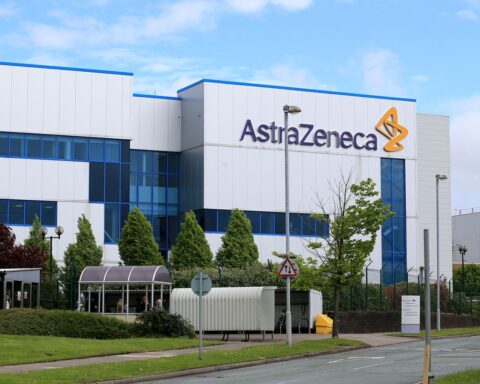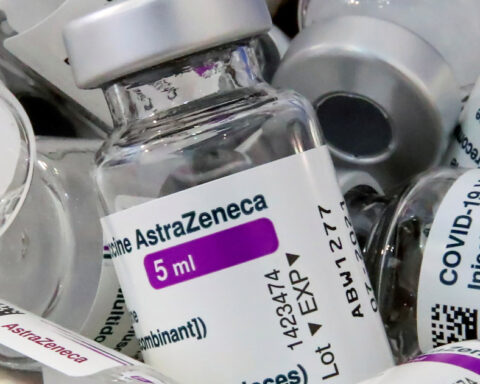where Tagrisso reduced the risk of disease recurrence or death by 80%
AstraZeneca’s Tagrisso (osimertinib) has been approved in the US for the adjuvant treatment of adult patients with early-stage epidermal growth factor receptor-mutated (EGFRm) non-small cell lung cancer (NSCLC) after tumour resection with curative intent. Tagrisso is indicated for EGFRm patients whose tumours have exon 19 deletions or exon 21 L858R mutations as detected by an approved test.

The approval was granted under the US Food and Drug Administration’s (FDA) Real-Time Oncology Review (RTOR) pilot program. Five other countries participated in a concurrent submission and review process through FDA’s Project Orbis.
While up to 30% of all patients with NSCLC may be diagnosed early enough to have potentially curative surgery, disease recurrence is still common in early-stage disease and nearly half of patients diagnosed in Stage IB, and over three quarters of patients diagnosed in Stage IIIA, experience recurrence within five years.1-4
The approval was based on results from the ADAURA Phase III trial where Tagrisso demonstrated a statistically significant and clinically meaningful improvement in disease-free survival (DFS) in the primary analysis population of patients with Stage II and IIIA EGFRm NSCLC, and also in the overall trial population of patients with Stage IB-IIIA disease, a key secondary endpoint.
Roy S. Herbst, MD, PhD, chief of Medical Oncology at Yale Cancer Center and Smilow Cancer Hospital, New Haven, CT and principal investigator in the ADAURA Phase III trial, said: “Adjuvant Tagrisso has demonstrated an unprecedented disease-free survival benefit for early-stage lung cancer patients with EGFR mutations who face high rates of recurrence even after successful surgery and subsequent chemotherapy. This approval reinforces how critical it is to test all lung cancer patients for EGFR mutations before deciding how to treat them and regardless of their stage at diagnosis. This will help ensure as many patients as possible can benefit from this potentially practice-changing treatment.”
Dave Fredrickson, Executive Vice President, Oncology Business Unit, said: “For the first time, a targeted, biomarker-driven treatment option is available to patients in the US with early-stage EGFR-mutated lung cancer. This approval dispels the notion that treatment is over after surgery and chemotherapy, as the ADAURA results show that Tagrisso can dramatically change the course of this disease. We remain committed to treating cancer patients earlier, when they may still have a chance of being cured.”
Adjuvant treatment with Tagrisso reduced the risk of disease recurrence or death by 83% in the primary endpoint of DFS in patients with Stage II and IIIA disease (hazard ratio [HR] 0.17; 95% confidence interval [CI] 0.12-0.23; p<0.0001). DFS results in the overall trial population of patients with Stage IB-IIIA disease showed Tagrisso reduced the risk of disease recurrence or death by 80% (HR 0.20; 95% CI 0.15-0.27; p<0.0001). At two years, 89% of patients treated with Tagrisso remained alive and disease free versus 52% on placebo after surgery, the current standard of care. The safety and tolerability of Tagrisso in this trial was consistent with previous trials in the metastatic setting.
Tagrisso was recently granted Breakthrough Therapy Designation for patients in the early-stage disease setting by the US FDA. In April 2020, an Independent Data Monitoring Committee recommended for the ADAURA trial to be unblinded two years early based on a determination of overwhelming efficacy. Investigators and patients continue to participate in the trial and remain blinded to treatment. The results from the ADAURA trial were presented during the plenary session of the American Society of Clinical Oncology ASCO20 Virtual Scientific Program in May 2020 and were recently published in The New England Journal of Medicine.
The US regulatory submission was reviewed under the FDA’s RTOR pilot program which aims to ensure that safe and effective treatments are available to patients as early as possible. Five national health authorities collaborated with the FDA on this review through Project Orbis, an initiative of the FDA Oncology Center of Excellence, which provides a framework for concurrent submission and review of oncology medicines among international partners. These included Health Canada, the Australian Therapeutic Goods Administration, the Brazilian Health Regulatory Agency (Anvisa), Swissmedic, and Singapore Health Sciences Authority. The UK Medicines and Healthcare products Regulatory Agency participated in the review as an observer.
In China, Tagrisso is under priority review for the adjuvant treatment of patients with early-stage EGFRm NSCLC based on the ADAURA Phase III trial. This indication is also under regulatory review in the EU and additional global submission discussions are ongoing.
Tagrisso is a once-daily oral tablet approved for the 1st-line treatment of patients with locally advanced or metastatic EGFRm NSCLC and for the treatment of locally advanced or metastatic EGFR T790M mutation-positive NSCLC in the US, Japan, China, the EU and many other countries around the world.
Lung cancer
Lung cancer is the leading cause of cancer death among both men and women, accounting for about one-fifth of all cancer deaths.5 Lung cancer is broadly split into NSCLC and small cell lung cancer, with 80-85% classified as NSCLC.6 The majority of all NSCLC patients are diagnosed with advanced disease while approximately 25-30% present with resectable disease at diagnosis.1-3
For patients with resectable tumours, the majority of patients eventually develop recurrence despite complete tumour resection and adjuvant chemotherapy.4 Early-stage lung cancer diagnoses are often only made when the cancer is found on imaging for an unrelated condition.7-8
Approximately 10-15% of NSCLC patients in the US and Europe, and 30-40% of patients in Asia have EGFRm NSCLC.9-11 These patients are particularly sensitive to treatment with an EGFR-tyrosine kinase inhibitor (EGFR-TKI) which block the cell-signalling pathways that drive the growth of tumour cells.12
ADAURA
ADAURA is a randomised, double-blinded, global, placebo-controlled Phase III trial in the adjuvant treatment of 682 patients with Stage IB, II, IIIA EGFRm NSCLC following complete tumour resection and adjuvant chemotherapy as indicated. Patients were treated with Tagrisso 80mg once-daily oral tablets or placebo for three years or until disease recurrence.
The trial enrolled in more than 200 centres across more than 20 countries, including the US, in Europe, South America, Asia and the Middle East. The primary endpoint was DFS in Stage II and IIIA patients and a key secondary endpoint was DFS in Stage IB, II and IIIA patients. The data readout was originally anticipated in 2022. The trial will continue to assess overall survival.
Tagrisso
Tagrisso (osimertinib) is a third-generation, irreversible EGFR-TKI with clinical activity against central nervous system metastases. Tagrisso 40mg and 80mg once-daily oral tablets have received approval in the US, Japan, China, the EU and many countries around the world for 1st-line EGFRm advanced NSCLC and EGFR T790M mutation-positive advanced NSCLC.
AstraZeneca in lung cancer
AstraZeneca has a comprehensive portfolio of approved and potential new medicines in late-stage development for the treatment of different forms of lung cancer spanning different histologies, several stages of disease, lines of therapy and modes of action.
AstraZeneca aims to address the unmet needs of patients with EGFRm tumours as a genetic driver of disease with the approved medicines Iressa (gefitinib) and Tagrisso, and its ongoing Phase III trials LAURA, NeoADAURA, and FLAURA2.
AstraZeneca is committed to addressing tumour mechanisms of resistance through the ongoing Phase II trials SAVANNAH and ORCHARD which test Tagrisso in combination with savolitinib, a selective inhibitor of c-MET receptor tyrosine kinase, along with other potential new medicines.
AstraZeneca in oncology
AstraZeneca has a deep-rooted heritage in oncology and offers a quickly growing portfolio of new medicines that has the potential to transform patients’ lives and the Company’s future. With seven new medicines launched between 2014 and 2020, and a broad pipeline of small molecules and biologics in development, the Company is committed to advance oncology as a key growth driver for AstraZeneca focused on lung, ovarian, breast and blood cancers.
By harnessing the power of six scientific platforms – Immuno-Oncology, Tumour Drivers and Resistance, DNA Damage Response, Antibody Drug Conjugates, Epigenetics, and Cell Therapies – and by championing the development of personalised combinations, AstraZeneca has the vision to redefine cancer treatment and one day eliminate cancer as a cause of death.
AstraZeneca
AstraZeneca (LSE/STO/Nasdaq: AZN) is a global, science-led biopharmaceutical company that focuses on the discovery, development and commercialisation of prescription medicines, primarily for the treatment of diseases in three therapy areas – Oncology, Cardiovascular, Renal & Metabolism, and Respiratory & Immunology. Based in Cambridge, UK, AstraZeneca operates in over 100 countries and its innovative medicines are used by millions of patients worldwide. Please visit astrazeneca.com and follow the Company on Twitter @AstraZeneca.






